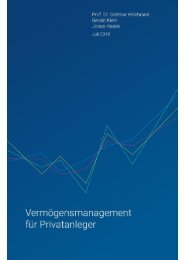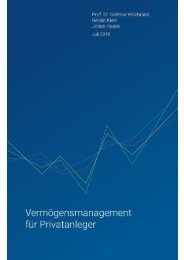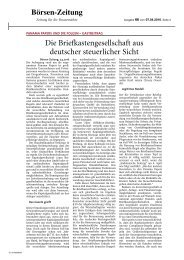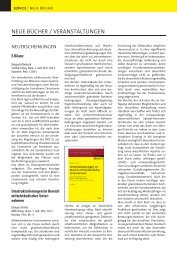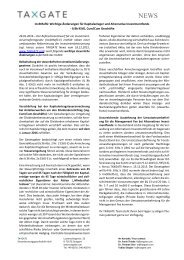You also want an ePaper? Increase the reach of your titles
YUMPU automatically turns print PDFs into web optimized ePapers that Google loves.
NORTH AMERICA Q&A
C A N A D A
Q&A with Philippe Belair
Managing partner, Tax & Legal
Deloitte Canada
What was the most significant development in your
region/jurisdiction’s tax practice in the past 18 months?
In the past 18 months, our Tax & Legal practice nationalized our
service lines. We gradually introduced the national model, starting
with a few service lines that lent themselves well to a national structure
due to their size and the nature of their work. Throughout the
process, the benefits to this approach for both our clients and our
talent were clear, and today, all 11 of our service lines operate on
this model.
We also enhanced our service offerings, building out our legal
practice and introducing our Operations Transformation for Tax
program, to the market. We consolidated our go-to-market approach
for our cross-border service lines (International Tax and Transfer
Pricing). We have also been expanding the scope of our National Tax
Office in order to enhance our capability to bring world-class tax advice
in the face of ever-increasing complexity of tax issues.
What was the most notable effect of that change?
The most notable effect from our decision to nationalize our practice
is our ability to collaborate for a measurable impact, both internally
and in the marketplace. We now have a framework that
improves our efficiency in bringing the right resources to the right
opportunities. This increases the synergy among teams, both our
client teams and our internal teams, which produces impactful results
in our service delivery.
Where is the market moving in this practice area?
The market is moving towards consolidated market offerings and
our national structure positions us well to deliver against this expectation.
Clients want trusted business advisors not just single service
delivery professionals.
A significant number of companies across all industries are undergoing
digital transformation and this impacts all aspects of their
business. The onus is on Deloitte to bring specialists to the table so
we can have holistic discussions with our clients about the implications
and opportunities associated with these types of transformations.
For Tax & Legal, this means we are frequently collaborating
with other parts of our business, such as Consulting, to bring increasing
value to clients during these discussions and having greater
impact through our ability to provide tax advice and guidance as
organization undergo transformation.
We have also been seeing a significant increase in the amount of
cross-border tax advisory work related to the impacts of tax reform,
which has occurred in several jurisdictions relevant to both
Canadian in-bound and Canadian out-bound investments. Our
consolidated market offerings and our national structure has enabled
us to respond to these changes in an efficient, proactive, and
consistent manner.
What kind of impact will this have on your work?
I am noticing the impact of this through my own work, where clients
reach out to Deloitte Canada as a problem solver for their business
problems, and not just a firm that can service their tax functions.
With respect to the digital transformations, Tax & Legal is teaming
more frequently with the firm’s advisory businesses to help the clients
navigate all the components of their business impacted by this transformation.
Deloitte’s unified presence in the market with our tax and
advisory services differentiates us, because not all of our competitors
can bring these perspectives to the table.
Do you anticipate any significant legislative changes in the
future with a material impact on tax in your region?
Based on the Liberal Party election platform and subsequent Mandate
Letters from the Prime Minister to the Minister of Finance and the
Minister of Revenue, some legislative developments were anticipated
including Canadian versions of Actions 2 (anti-hybrid rules) and 4
(interest expense restriction rules) of the OECD led Base Erosion and
Profit Shifting (BEPS) project. It remains to be seen if this will move
forward in the context of the global financial crisis caused by the
COVID-19 pandemic.
Like a number of other countries, Canada implemented very significant
emergency relief monetary and fiscal measures, including tax
measures, in response to the crisis. On a short- to medium-term basis,
we will likely see a phasing out of the emergency measures along with
90 EXPERTGUIDES TAX





